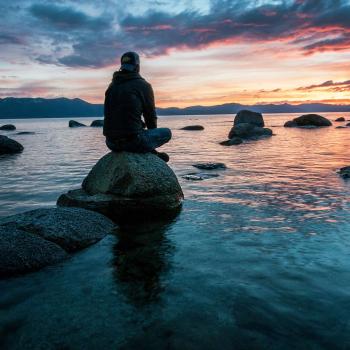More than this, if I can wrestle with God, if I can express my uncertainty with God in the intimacy of challenging relationship, then, paradoxically, I convert my doubt into the core certainty of divine relationship and even incarnation. The deep living into the Question itself becomes the deep livingness of the answer as compassionate response, which implies the intimacy of relationship with the source of goodness, with the love intelligence of All-That-Is. The authentic existential question shouted out from the depth of being implies, paradoxically, the possibilities of intimacy, relationship, and even potential dialogue.
It is to this paradox that we will now turn. We dance in the paradox of certainty and uncertainty. An event like the tsunami is of a different order than the human-made suffering of war and oppression, of a Rwanda or a Bosnia or even a Libya. It's a natural event, the result of earth processes that don't take account of the human, but which have their own validity. Nonetheless, when there is death and destruction and social disorder on this scale, it is natural and right and necessary to ask the question: Where are you, God? Where are you within me and within the world?
Here lives the great and sacred paradox of realization. Within the very recesses of the uncertainty of the question itself pulses a powerful experience of certainty and intimate knowing. Deeper into the nondual realization of "I Am" lies one's deepest relationship with I Am. It is in I Am that I experience the core certainty of self, and therefore of my divinity, and of my being loved by God. This experience is not only not in contradiction to the question; it wells up from the question itself. In the question is God. The question is theanswer.
Two 19th-century Russians: Nachman and Dostoyevsky
It is this paradox that Dostoyevsky in Brothers Karamazov does not fully grasp. He does not understand that the rage of Ivan is the rage of "heresy that is faith." Ivan, responding to Alyosha's certainty of belief, has just described to him the brutal murder of a child torn apart by dogs for sport. Ivan's uncertainty burns with the fiery anger of faith.
Although the passage is longer than what one would usually expect in a quoted text, it is so germane to our theme and so compelling that I did not shorten it. Thus I invite my dear reader to experience the truth and power of Ivan's plea. He needs to be read as a modern echo of Abraham's cry: "Will the judge of the entire world not do justice?"
I must have justice, or I will destroy myself. And not justice in some remote infinite time and space, but here on earth, and that I could see myself. I have believed in it. I want to see it, and if I am dead by then, let me rise again, for if it all happens without me, it will be too unfair. Surely I haven't suffered, simply that I, my crimes and my sufferings, may manure the soil of the future harmony for somebody else.
I want to see with my own eyes the hind lie down with the lion and the victim rise up and embrace his murderer. I want to be there when everyone suddenly understands what it has all been for. All the religions of the world are built on this longing, and I am a believer.
But then there are the children, and what am I to do about them? That's a question I can't answer. For the hundredth time I repeat, there are numbers of questions, but I've only taken the children, because in their case what I mean is so answerably clear. Listen! If all must suffer to pay for the eternal harmony, what have children to do with it, tell me, please? It's beyond all comprehension why they should suffer, and why they should pay for the harmony. Why should they, too, furnish material to enrich the soil for the harmony of the future? I understand solidarity in sin among men. I understand solidarity in retribution too, but there can be no such solidarity with children. And if it is really true that they must share responsibility for all their father's crimes, such a truth is not of this world and is beyond my comprehension.
Some jester will say, perhaps, that the child would have grown up and have sinned, but you see he didn't grow up; he was torn to pieces by the dogs, at eight years old. Oh, Alyosha, I am not blaspheming! I understand, of course, what an upheaval of the universe it will be, when everything in heaven and earth blends in one hymn of praise and everything that lives and has lived cries aloud: 'Thou art just, O Lord, for Thy ways are revealed.' When the mother embraces the fiend who threw her child to the dogs, and all three cry aloud with tears, 'Thou art just, O Lord!' then, of course, the crown of knowledge will be reached and all will be made clear.




